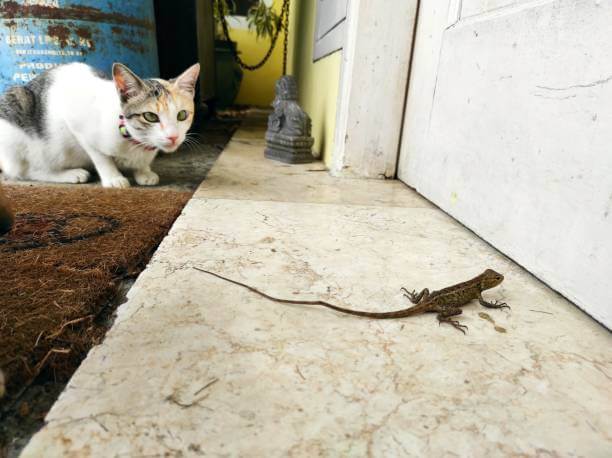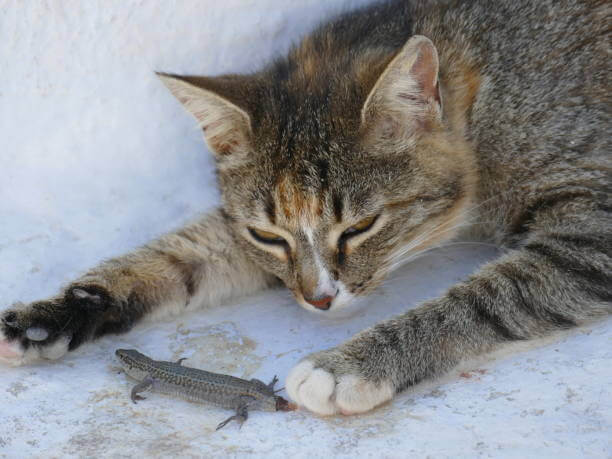Is it safe to let your can cats eat lizards you find in the wild or around the house? Find out what experts have to say on this topic. Have you ever witnessed your feline companion hunting or pouncing on a lizard in your backyard? It’s a sight that can simultaneously amaze and concern us as cat owners. As natural-born predators, cats have an instinctual drive to hunt small creatures, including lizards. But does that mean it’s safe for them to indulge in their predatory instincts?
In this article, we’ll explore the question “Can cats eat lizards?” to provide you with a comprehensive understanding of the potential risks, benefits, and considerations associated with this behavior. So let’s dive into the fascinating world of feline dining habits.
The Hunting Instinct: Unleashing the Predator Within

Before we delve into whether cats can safely consume lizards, let’s first understand why they are so inclined to chase after these scaly creatures in the first place.
A Legacy of Predation
Cats are descendants of wild ancestors who relied on hunting to survive. Even though our modern-day domesticated felines enjoy cozy lives indoors, their predatory instincts remain deeply ingrained. The thrill of the chase and capturing prey is not only an instinctual behavior but also provides mental stimulation for our furry friends.
The Joy of Stalking
Have you ever noticed how intently your cat watches its surroundings or crouches down low when eyeing potential prey? This stalking behavior is an essential part of their hunting strategy. By carefully observing their target and slowly moving towards it, cats increase their chances of success while minimizing energy expenditure.
Pounce! The Final Act
The moment a cat decides it’s time to strike is both swift and precise. With lightning-fast reflexes and sharp claws at the ready, they pounce on their unsuspecting victim. This act not only showcases their impressive agility but also satisfies their innate need for physical engagement.
Potential Risks of Lizard Consumption
While cats may be hardwired to hunt and capture lizards, it’s crucial to consider the potential risks associated with their consumption. Here are a few factors to keep in mind:
Toxicity Concerns
Lizards, such as some species of geckos and skinks, possess a defense mechanism that involves secreting toxic substances when threatened. While these toxins may not pose a significant risk to humans, they can be harmful or even deadly to our feline companions if ingested.
Parasites and Diseases
Lizards can carry parasites, bacteria, or viruses that could potentially harm cats upon ingestion. These parasites may cause gastrointestinal issues, infections, or other health complications. It’s essential to remember that not all lizards harbor harmful organisms, but the risk should still be considered.
Physical Dangers
Beyond the potential health risks associated with consuming lizards, there are also physical dangers involved. Sharp lizard tails or bones could cause choking hazards or internal injuries if swallowed by a cat. Therefore, even if your cat successfully captures a lizard during its hunting escapades, it’s best to discourage them from eating it.
Understanding Your Can Cats Eat Lizards

To determine whether your cat can eat lizards safely, we must consider their dietary requirements as obligate carnivores.
Meat: The Foundation of Their Diet
Cats require meat as the primary component of their diet due to their unique nutritional needs. They rely on animal proteins for essential amino acids and other vital nutrients like taurine and vitamin A. While small amounts of plant matter might find their way into a cat’s digestive system through prey consumption (including lizards), it’s important to prioritize an appropriate balance of animal-based food sources.
Complete and Balanced Nutrition
Commercially available cat foods are formulated to provide complete and balanced nutrition for our feline friends. These diets are carefully designed by experts who understand the specific dietary requirements of cats, ensuring that they receive all the necessary nutrients in the right proportions. Therefore, it’s generally recommended to rely on high-quality cat food as the foundation of your cat’s diet.
Alternatives to Lizard Consumption
Considering the potential risks associated with cats eating lizards, it’s important to provide alternative outlets for their hunting instincts.
Interactive Playtime
Engaging your cat in interactive play sessions can help fulfill their natural hunting instincts in a safe and controlled manner. Using toys that mimic prey-like movements or engaging in games of chase can provide mental stimulation and physical exercise.
Puzzle Feeders
Puzzle feeders are excellent tools for mentally stimulating your feline companion while also satisfying their natural instinct to work for their food. These feeding devices require cats to engage in problem-solving behaviors, simulating the hunting experience without any risk to lizards or other small creatures.
Environmental Enrichment
Creating an enriching environment for your cat can go a long way in keeping them entertained and mentally stimulated. Providing scratching posts, climbing trees, and access to window perches where they can observe birds or squirrels outside can help alleviate their desire to hunt live prey.
Does My Cat Need to Go to a Vet if They Eat a Lizard?
If you suspect that your cat has eaten a lizard, it’s important to consult with your veterinarian as soon as possible. They can provide vital information about potential risks and recommend the best course of action for managing any health concerns.
How to Protect Your Cat from Reptiles
The best way to protect your cat from potential harm due to lizard consumption is to discourage them from hunting in the first place. Here are a few tips you can use:
- Supervise Your Cat: Keeping an eye on your cat’s whereabouts while outdoors will help ensure that they’re not engaging in risky behaviors such as hunting lizards.
- Secure Your Home: Making sure that all windows, doors, and other points of entry are secured can help prevent lizards from entering your home.
- Provide Appropriate Outlets: Ensuring your cat has access to interactive toys and puzzle feeders will provide an alternative outlet for their hunting instincts in a safe manner.
FAQS
Q: Are lizards dangerous for cats?
A: Lizards can potentially pose a risk to cats if ingested. This is due to the possibility of lizards carrying parasites, bacteria, or viruses as well as their defense mechanism involving toxic substances. It’s important to consider all potential risks before allowing your cat to hunt and consume lizards.
Q: How can I discourage my cat from hunting lizards?
A: The best way to keep your cat safe is to discourage them from hunting live prey. Providing interactive toys and puzzle feeders, creating an enriching environment with a variety of stimulating elements, and supervising them while outdoors are all great ways to deter cats from hunting lizards.
Q: What should I do if my cat eats a lizard?
A: If you suspect that your cat has eaten a lizard, it’s important to consult with your veterinarian as soon as possible. They can provide vital information about potential risks and recommend the best course of action for managing any health concerns.
Q: What should I feed my cat instead of lizards?
A: A nutritionally complete and balanced diet is best for your cat’s overall health. Commercially available cat foods are formulated to provide all the necessary nutrients in the right proportions, making them ideal for cats who don’t have access to alternate prey like lizards.
Conclusion
In conclusion, cats may naturally be inclined to consume lizards, but the potential risks associated with this behavior should be taken into consideration. Offering interactive toys, puzzle feeders, and an enriching environment is the best way to keep your cat safe from harm while also satisfying its natural hunting instincts. If you suspect that your cat has eaten a lizard, it’s important to consult with your veterinarian as soon as possible for more information about potential risks and the best course of action for managing any health concerns. With appropriate care and guidance, cats can enjoy a safe, healthy lifestyle without putting themselves in harm’s way.
